苏格拉底孔子比较英文演讲稿
- 格式:docx
- 大小:12.11 KB
- 文档页数:1
![当苏格拉底遇见孔子(英文)[推荐5篇]](https://uimg.taocdn.com/b22015aaa1116c175f0e7cd184254b35effd1a70.webp)
当苏格拉底遇见孔子(英文)[推荐5篇]第一篇:当苏格拉底遇见孔子(英文)In ancient Chinese and western,there are two education masters can be comparable to each other.one is Confucius in Chinaand the other one is the ancient Greek Socrates, which up to now are still praised in the world.Imagine, when Socrates meets Confucius, what sparks will they collide out?As we know, Confucius is considered as the greatest of the ancient Chinese sages, and Socrates was an ancient Greek philosopher who was regarded as a saint dying for the pursuit of the truth.When it comes to educational mode, they have something in common, but at the same time they still hold volume of different views.From the perspective of Confucius, Confucius's teaching method is the gentleman type, although in the teaching he is an amiable old man,he established the basic specification of teacher’sabsolute authority.In general, Confucius taught studentsby theknowledge-transference way.Although he also prompted the student, what he did was intended to find ways to let them understand what the teacher said better.So he was not happy for students against the intention of their teacher.This educational mode ismore to cultivate students to the teacher's loyalty and understanding, to believe in authority.However, Socrates’ teaching methods were quite different from Confucius’.He never taught studentsthe ready-made answers, buttookdispute, cross-examine and so on to force students to think for themselves, and finally found the answer to their questions.He didn’t care whether they thought the same with their teacher and they believe what the teacher saidor not.The Socrates’ mode is more to cultivate studentstheir own reasoning ability and self-awareness.So Plato, whowas good at thinking and pursued the dialectical way, became the heir of Socrates' education style.From the way of education, Confucius transmitted knowledge while Socrates forced students themselves to get knowledge;Confucius taught people to believe while Socrates taughtthem to doubt.Of course, they both paid attention to the heuristic teaching and encouraged independent thinking instead of the force-feeding teaching with results given directly.If they two learnt the teaching idea from each other, the world culture will be further integration.Also, China's feudal culture bound won't continue for so st but not least, the cultural conflicts will be reduced and the world will be more peaceful.第二篇:当苏格拉底遇见孔子(英文)In ancient Chinese and western, there are two education masters can be comparable to each other.one is Confucius [kənˈfju:ʃəs] in China and the other one is the ancient Greek Socrates[ˈsɔkrəti:z] , which up to now are still praised in the world.Imagine, when Socrates meets Confucius, what sparks will they collide out(碰撞出)? As we know, Confucius is considered as the greatest of theancient Chinese sages[seɪdʒz](圣人), and Socrates was an ancient Greek philosopher[fəˈlɒsəfə(r)](哲学家)who was regarded as a saint(圣人)dying for the pursuit(追求)of the truth.When it comes to educational mode[məʊd](方式), they have something in common, but at the same time they still hold volume[ˈvɒlju:m](大量)of different views.From the perspective (观点)of Confucius, Confucius's teaching method is the gentleman type, although in the teaching he is an amiable['eɪmɪəbl](和蔼可亲的)old man, he established[ɪˈstæblɪʃt](建立)the basic specification of teacher’s absolute authority(权利,权威).In general, Confucius taught students by the knowledge-transference way.Although he also prompted[p'rɒmptɪd](鼓励)the student, what he did was intended to find ways to let them understand what the teacher said better.So he was not happy for students against the intention(意图)of their teacher.This educational mode is more to cultivate(培养)students to the teacher's loyalty and understanding, to believe in authority.However, Socrates’ teaching methods were quite different from Confucius’.He never taught students the ready-made answers, but took dispute[dɪ'spju:t](辩论), cross-examine and so on to force students to think for themselves, and finally found the answer to their questions.He didn’t care whether they thought the same with their teacher and they believe what the teacher said or not.The Socrates’ mode is more to cultivate studentstheirownreasoningabilityand self-awareness[ˈselfəˈweənis](自我意识)So Plato['pleɪtəʊ](柏拉图), who was good at thinking and pursued(追求)the dialectical [ˈdaɪə'lektɪkl](辩证的)way, became the heir[eə(r)](继承人)of Socrates' education style.From the way of education, Confucius transmitted(传播)knowledge while Socrates forced students themselves to get knowledge;Confucius taught people to believe while Socrates taught them to doubt.Of course, they both paid attention to the heuristic[hjuˈrɪstɪk](启发式的)teaching and encouraged independent thinking instead of the force-feeding teaching with results given directly.If they two learnt the teaching idea fromeach other, the world culture will be further integration[ˈɪntɪ'ɡre ɪʃn](整合,一体化).Also, China's feudal[ˈfju:dl](封建的)culture bound[baʊnd](文化界)won't continue for so st but not least(最后), the cultural conflicts will be reduced and the world will be more peaceful.第三篇:当苏格拉底遇见孔子英语作文When Socrates Meets Confucius Common people come to the world with nothing, and leave with nothing.Great people come to the world with nothing, but they’ll leave with endless possibilities.Socrates and Confucius are such great people.Assuming these two wise individuals with their regional thoughts deeply in mind meet one day, what kind of spectacle will happen on them or even in the two countries, especially in China?Firstly, Chinese will gradually realize the importance of the establishment of the legal system.The Confucianism centered on morality.It emphasizes that morality is much more important than the law, which inversely causes the citizen’s law consciousness to be light.While the Socrates lived in a more law-based country, comparing to the virtue, he attached greater importance to the legislation.So, when Socrates meets Confucius, he will share his legal awareness with Confucius and finally blend it to the Chinese culture.Secondly, Chinese will deal with things in a more rational and scientific way.In ancient China, most people are superstitious.The Confucianism spread some kind of mysterious figure, such as the god and the fairy.So, many times when it came to something difficult to deal with or explain to the civilians, the rulers may choose to advocate the illusory theology to comfort them.This kind of handling will only cover up the facts in short term.While Socrates’ thought is scientific, he may havean absolutely different way to deal with the same thing.Thus, when Socrates meets Confucius, as the days progressed, Chinese will be more rational and no longer depend on the so called god to bless for a good life, but try to work hard on their own.Thirdly, Chinese culture will be more inclusive and exoteric in academic.The Confucianism is almost authoritarian in the ancient times, especially in the Qing dynasty, which limited the development of other schools.Whereas the Socrates treats the academic in a broader way, he recognizes the freedom of learning.Therefore, when Socrates meets Confucius, Chinese culture will develop in a more inclusive and exoteric way.Different thoughts will integrate and the Chinese culture will“sparking”.In conclusion, if Socrates meets Confucius, great changes must have happened to China in the establishment of the legal system, the rational and scientific Chinese manners of dealing with things and the more inclusive and exoteric Chinese culture.第四篇:当孔子遇到苏格拉底(英文)When socrates meet confucious Good afternoon.Welcome to the scene of the moot, I'm jane,the monitor for tod ay’s debating contest.It's a great honor for us to invite two heavyweight masters to launch a debate about education.First,let me introduce them ,the positive part is the metaphor for the father of philosophy , Socrates, and the opposite is from China which is the founder of Chinese Confucianism ,confucious.our topic is knowledge comes from the heart or gets by outside.Next, let us enjoy this language storm.Hello everyone, I am Socrates, my view is knoeledge just comes from our heart.The best person is your self, know yourself, to know the life.Human’s potential is unlimited, the purpose of education is to stimulate people'spotential.There is no absolute truth in the world, so I never told my students the answer to the question,I just proposed it, let them find the answer.it is because of people's creativity and imagination, make the world develop so quickly.so I think the knowledge comes from the heart.Dear students, I am confucious I believe that knowledge is acquired by the outside world, I am not one who was born in the possession of knowledge;I am one who is fond of antiquity, and earnest in seeking it there.I do not deny that the thinking of innovation, but we need the previous experience, the purpose of education is to inform you of their thinking.Only by standing on the shoulders of giants to see better.so I think knoledge just get from outside.Thank you.Listen to the great debate of two masters, I believe we will benefit a cate in realizing corpus society in the character of important role.learning without thinking is useless,thinking without learning is perilous.okay,our debate here is over, thanks to the support and welcome to see next time,goodbye.第五篇:英语演讲比赛《当苏格拉底遇上孔子》When Socrates meets ConfuciusYudan has said:”Confucius is grey,it’s splen did when grey is mixed with any other colours.”That is to say,Confucius interlinks the colourful world.Interlink is extensive,from east to west,from ancient times to modern times.The majority of people may can’t help asking:”what sparks can appear when con fucius interlinks Socrates?”So,today,the tittle of my speech is when Socrates meets confucius.Some people advocate that Socrates or confucius traverses to meet.While from my own perspective,Socrates is on behalf of ancient greek,confucius is on behalf of ancient china,to some extent,the title means that the culture of ancient greek meets culture of ancient china.Theystaged a similar life,bring hope and bright to their own country,making a difference.Socrates’concept of supremacy of law and a democratic society are invariably corresponded with confucius’ idea of ceremy and common society.Indeed, the waves pushed forward waves.In some ways,Socrates is superior to confucius.For example,the limitation of kinship that Socrates put forward is straightforward,on contrast,the view that confucius hold ispeople are more important than the ruler,giving us a more temperate feeling.We will form thesituation which is called a combination of Chinese and western when the two cultures meet.,which can help us own a finer and more harmonious society.。
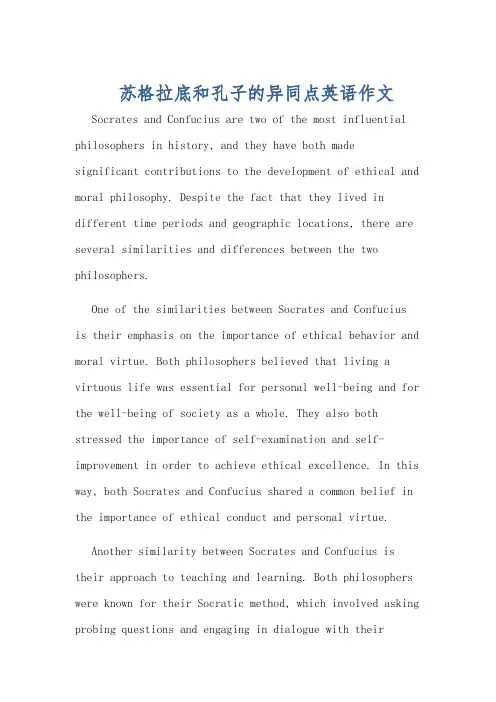
苏格拉底和孔子的异同点英语作文Socrates and Confucius are two of the most influential philosophers in history, and they have both madesignificant contributions to the development of ethical and moral philosophy. Despite the fact that they lived in different time periods and geographic locations, there are several similarities and differences between the two philosophers.One of the similarities between Socrates and Confuciusis their emphasis on the importance of ethical behavior and moral virtue. Both philosophers believed that living a virtuous life was essential for personal well-being and for the well-being of society as a whole. They also both stressed the importance of self-examination and self-improvement in order to achieve ethical excellence. In this way, both Socrates and Confucius shared a common belief in the importance of ethical conduct and personal virtue.Another similarity between Socrates and Confucius is their approach to teaching and learning. Both philosophers were known for their Socratic method, which involved asking probing questions and engaging in dialogue with theirstudents in order to encourage critical thinking and self-discovery. Similarly, Confucius also emphasized the importance of education and the cultivation of moral character through learning and self-reflection. Both philosophers believed in the transformative power of education and the importance of self-examination in order to achieve personal and societal improvement.Despite these similarities, there are also some notable differences between Socrates and Confucius. One of the key differences lies in their philosophical focus. Socrates was primarily concerned with the pursuit of knowledge and the search for universal truths, while Confucius was more focused on the practical application of moral principles and the cultivation of ethical behavior in everyday life. Additionally, Socrates' philosophical inquiries often centered around metaphysical and epistemological questions, while Confucius' teachings were more focused on social and ethical issues.Another difference between Socrates and Confucius is their cultural and historical context. Socrates lived in ancient Greece during a time of great intellectual andphilosophical ferment, while Confucius lived in ancient China during a period of social and political upheaval. Asa result, their philosophical ideas were shaped by the unique cultural and historical circumstances in which they lived, leading to differences in their philosophical perspectives and teachings.In conclusion, while Socrates and Confucius shared some commonalities in their emphasis on ethical behavior, moral virtue, and the importance of education, they also had distinct philosophical focuses and were shaped by different cultural and historical contexts. Despite these differences, both philosophers have had a profound and lasting impact on the development of ethical and moral philosophy, and their teachings continue to be studied and admired by people around the world.苏格拉底和孔子是历史上最有影响力的哲学家之一,他们都对伦理道德哲学的发展做出了重要贡献。
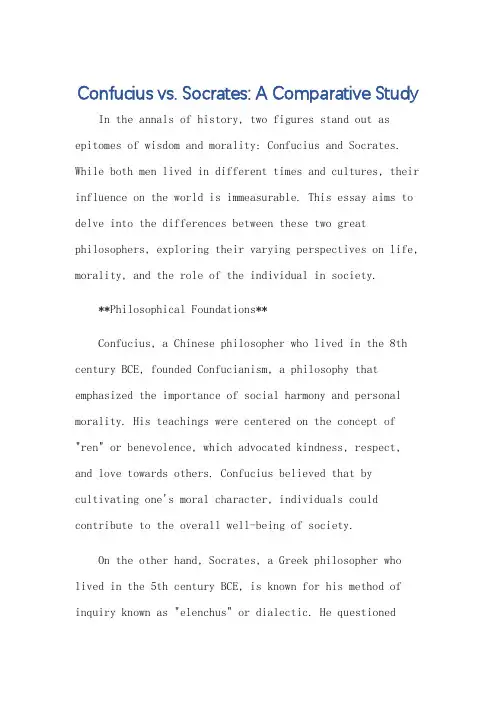
Confucius vs. Socrates: A Comparative Study In the annals of history, two figures stand out as epitomes of wisdom and morality: Confucius and Socrates. While both men lived in different times and cultures, their influence on the world is immeasurable. This essay aims to delve into the differences between these two great philosophers, exploring their varying perspectives on life, morality, and the role of the individual in society.**Philosophical Foundations**Confucius, a Chinese philosopher who lived in the 8th century BCE, founded Confucianism, a philosophy that emphasized the importance of social harmony and personal morality. His teachings were centered on the concept of "ren" or benevolence, which advocated kindness, respect, and love towards others. Confucius believed that by cultivating one's moral character, individuals could contribute to the overall well-being of society.On the other hand, Socrates, a Greek philosopher who lived in the 5th century BCE, is known for his method of inquiry known as "elenchus" or dialectic. He questionedeverything, seeking the truth through rigorous examination and debate. Socrates emphasized the importance of self-knowledge and the ethical life, believing that true wisdom came from knowing oneself and living in accordance with one's principles.**Views on Morality**Confucius' morality was rooted in social harmony. He believed that individuals should follow the "golden rule" of treating others as they would like to be treated, upholding the virtues of loyalty, filial piety, and righteousness. Confucian morality was less focused on abstract principles and more on practical applications, emphasizing the role of the individual in maintaining social order.In contrast, Socrates' morality was more focused on individual character and virtue. He believed that morality was not just about following rules but about living a life of truth and wisdom. Socrates questioned the conventional moral codes of his society, challenging people to think critically and examine their own beliefs. His morality wasless about maintaining social harmony and more about personal growth and authenticity.**Role of the Individual in Society**Confucius advocated a hierarchical social structure in which individuals should play their designated roles in maintaining social order. He believed that each person hada duty to contribute to the welfare of society, whether it was through governance, military service, or family life. Confucius saw the individual as a means to societal harmony, rather than an end in itself.On the contrary, Socrates saw the individual as thecore of society. He believed that true progress and wisdom came from the free exchange of ideas and criticism among individuals. Socrates challenged the authorities of his time, questioning their wisdom and seeking the truththrough dialogue. He saw the individual as an agent of change and progress, not just a cog in the social machine.**Conclusion**Confucius and Socrates, though separated by thousandsof miles and centuries, offer two distinct yetcomplementary perspectives on life and morality. Confucius' emphasis on social harmony and personal morality provides a framework for understanding one's role in maintaining societal well-being. On the other hand, Socrates' focus on individual character and the pursuit of truth challenges us to think critically and question authority. Together, their teachings offer a rich tapestry of wisdom that continues to guide and inspire us in our quest for understanding and enlightenment.**孔子与苏格拉底之比较**在历史的长河中,两位伟人以其智慧和道德成为了时代的标杆:孔子与苏格拉底。
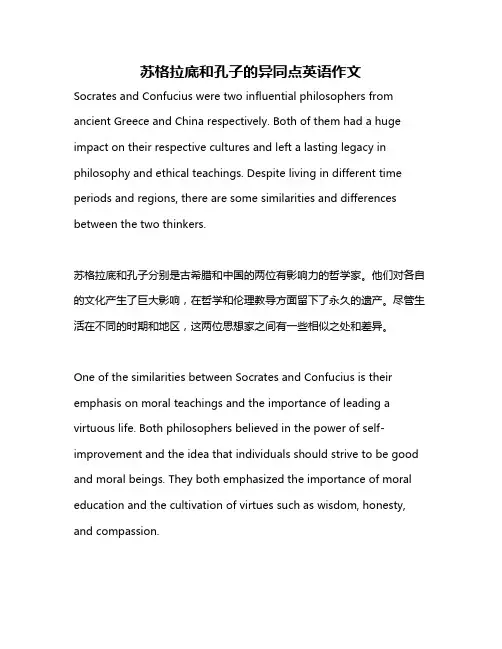
苏格拉底和孔子的异同点英语作文Socrates and Confucius were two influential philosophers from ancient Greece and China respectively. Both of them had a huge impact on their respective cultures and left a lasting legacy in philosophy and ethical teachings. Despite living in different time periods and regions, there are some similarities and differences between the two thinkers.苏格拉底和孔子分别是古希腊和中国的两位有影响力的哲学家。
他们对各自的文化产生了巨大影响,在哲学和伦理教导方面留下了永久的遗产。
尽管生活在不同的时期和地区,这两位思想家之间有一些相似之处和差异。
One of the similarities between Socrates and Confucius is their emphasis on moral teachings and the importance of leading a virtuous life. Both philosophers believed in the power of self-improvement and the idea that individuals should strive to be good and moral beings. They both emphasized the importance of moral education and the cultivation of virtues such as wisdom, honesty, and compassion.苏格拉底和孔子之间的一个相似之处是他们强调道德教导和领导一个有道德的生活的重要性。
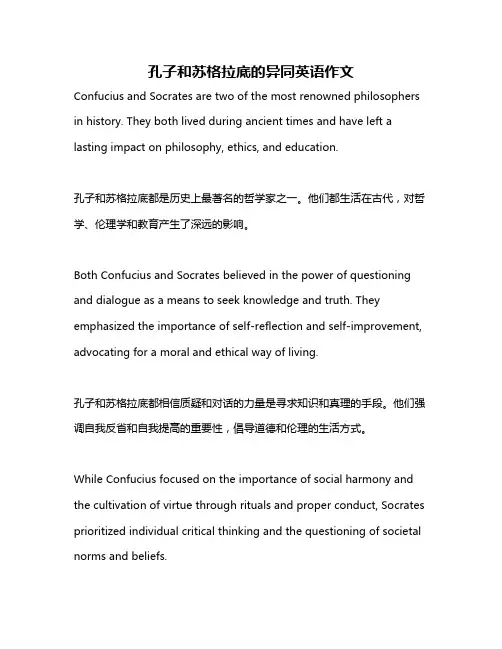
孔子和苏格拉底的异同英语作文Confucius and Socrates are two of the most renowned philosophers in history. They both lived during ancient times and have left a lasting impact on philosophy, ethics, and education.孔子和苏格拉底都是历史上最著名的哲学家之一。
他们都生活在古代,对哲学、伦理学和教育产生了深远的影响。
Both Confucius and Socrates believed in the power of questioning and dialogue as a means to seek knowledge and truth. They emphasized the importance of self-reflection and self-improvement, advocating for a moral and ethical way of living.孔子和苏格拉底都相信质疑和对话的力量是寻求知识和真理的手段。
他们强调自我反省和自我提高的重要性,倡导道德和伦理的生活方式。
While Confucius focused on the importance of social harmony and the cultivation of virtue through rituals and proper conduct, Socrates prioritized individual critical thinking and the questioning of societal norms and beliefs.虽然孔子关注社会和谐的重要性,通过仪式和行为的正确实践来培养美德,而苏格拉底则将个体批判性思维和对社会规范和信念的质疑放在首位。
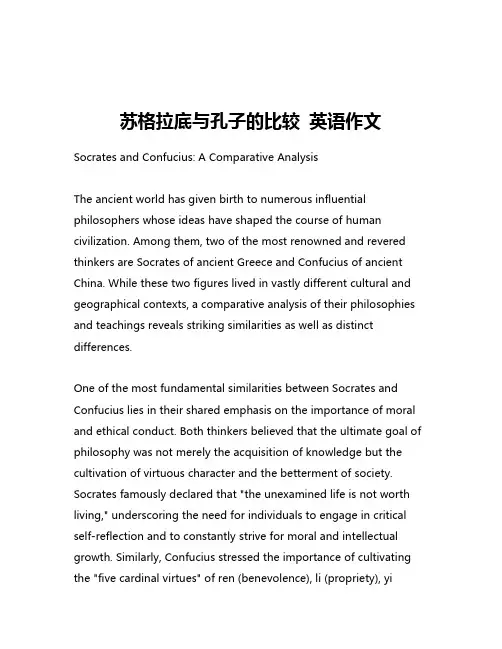
苏格拉底与孔子的比较英语作文Socrates and Confucius: A Comparative AnalysisThe ancient world has given birth to numerous influential philosophers whose ideas have shaped the course of human civilization. Among them, two of the most renowned and revered thinkers are Socrates of ancient Greece and Confucius of ancient China. While these two figures lived in vastly different cultural and geographical contexts, a comparative analysis of their philosophies and teachings reveals striking similarities as well as distinct differences.One of the most fundamental similarities between Socrates and Confucius lies in their shared emphasis on the importance of moral and ethical conduct. Both thinkers believed that the ultimate goal of philosophy was not merely the acquisition of knowledge but the cultivation of virtuous character and the betterment of society. Socrates famously declared that "the unexamined life is not worth living," underscoring the need for individuals to engage in critical self-reflection and to constantly strive for moral and intellectual growth. Similarly, Confucius stressed the importance of cultivating the "five cardinal virtues" of ren (benevolence), li (propriety), yi(righteousness), zhi (wisdom), and xin (integrity) as the foundation for a harmonious and just society.Another striking similarity between Socrates and Confucius is their shared belief in the power of dialogue and discourse as a means of acquiring knowledge and promoting moral and social progress. Both thinkers were renowned for their use of the Socratic method, engaging in a process of questioning and challenging their interlocutors to help them arrive at a deeper understanding of themselves and the world around them. Socrates, through his famous dialogues recorded by his student Plato, demonstrated how the relentless pursuit of truth through rigorous questioning and debate could lead to the uncovering of fundamental truths about the nature of virtue, justice, and the good life. Similarly, Confucius emphasized the importance of cultivating the art of conversation, encouraging his students to engage in respectful and thoughtful dialogue as a means of developing their moral and intellectual capacities.Despite these similarities, Socrates and Confucius also exhibited distinct differences in their philosophical approaches and the specific concerns that animated their respective teachings. Socrates, for instance, was deeply preoccupied with the concept of the "examined life" and the pursuit of universal, objective truths about the nature of virtue and the good life. His relentless questioning and skepticismtowards traditional beliefs and social norms often led him into conflict with the Athenian authorities, ultimately resulting in his trial and execution on charges of impiety and corrupting the youth.In contrast, Confucius was more concerned with the practical application of moral and ethical principles in the context of social and political institutions. His teachings were primarily focused on cultivating virtuous character, promoting harmonious social relationships, and establishing a well-ordered and just society. Unlike Socrates, who was deeply skeptical of the ability of the state to promote moral and intellectual growth, Confucius believed that the role of the ruler was to set an example of moral and ethical conduct, and to create a social and political environment that would encourage the cultivation of virtue among the people.Moreover, while Socrates was deeply influenced by the philosophical traditions of the pre-Socratic thinkers and the emerging field of natural philosophy, Confucius drew heavily on the rich cultural and literary heritage of ancient China, including the teachings of the Yijing (Book of Changes) and the Analects of Confucius, which served as the foundation for his moral and ethical philosophy.Despite these differences, both Socrates and Confucius have left an indelible mark on the intellectual and cultural landscape of their respective civilizations. Their teachings have continued to inspire andinfluence thinkers, scholars, and leaders across the centuries, and their legacies continue to shape the way we understand the fundamental questions of human existence, the nature of virtue and the good life, and the role of the individual in shaping the social and political order.In conclusion, the comparative analysis of Socrates and Confucius reveals the remarkable similarities and differences between these two great thinkers. While they lived in vastly different cultural and geographical contexts, their shared emphasis on the importance of moral and ethical conduct, the power of dialogue and discourse, and the pursuit of truth and virtue has made them enduring icons of human wisdom and intellectual achievement. By exploring the nuances and complexities of their respective philosophies, we can gain a deeper appreciation for the richness and diversity of the human intellectual tradition, and the timeless relevance of their teachings in our own lives and societies.。
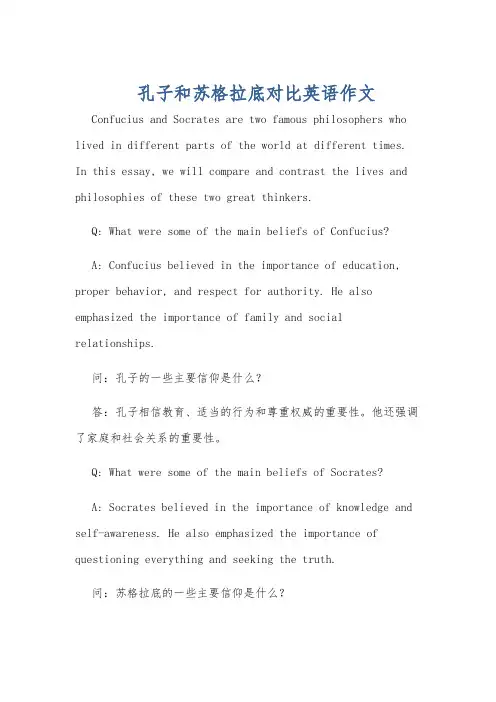
孔子和苏格拉底对比英语作文Confucius and Socrates are two famous philosophers who lived in different parts of the world at different times. In this essay, we will compare and contrast the lives and philosophies of these two great thinkers.Q: What were some of the main beliefs of Confucius?A: Confucius believed in the importance of education, proper behavior, and respect for authority. He also emphasized the importance of family and social relationships.问:孔子的一些主要信仰是什么?答:孔子相信教育、适当的行为和尊重权威的重要性。
他还强调了家庭和社会关系的重要性。
Q: What were some of the main beliefs of Socrates?A: Socrates believed in the importance of knowledge and self-awareness. He also emphasized the importance of questioning everything and seeking the truth.问:苏格拉底的一些主要信仰是什么?答:苏格拉底相信知识和自我意识的重要性。
他还强调了质疑一切和寻求真相的重要性。
Q: How did Confucius and Socrates view the role of the individual in society?A: Confucius believed that individuals should strive to be virtuous and fulfill their social roles. Socrates believed that individuals should question authority and strive for personal enlightenment.问:孔子和苏格拉底如何看待个人在社会中的角色?答:孔子认为个人应该努力做到有道德和履行他们的社会角色。
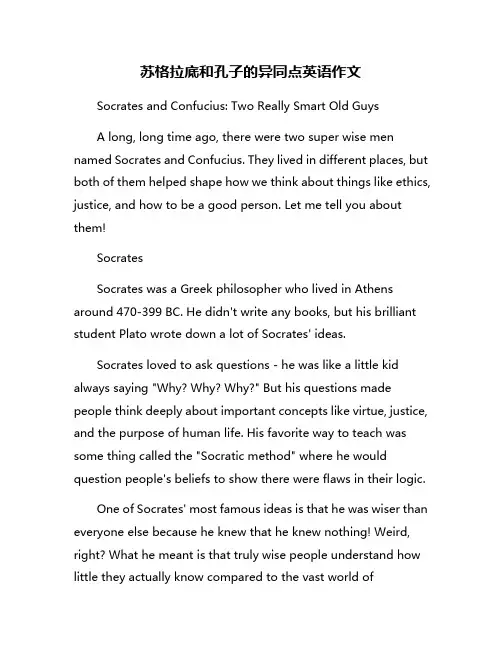
苏格拉底和孔子的异同点英语作文Socrates and Confucius: Two Really Smart Old GuysA long, long time ago, there were two super wise men named Socrates and Confucius. They lived in different places, but both of them helped shape how we think about things like ethics, justice, and how to be a good person. Let me tell you about them!SocratesSocrates was a Greek philosopher who lived in Athens around 470-399 BC. He didn't write any books, but his brilliant student Plato wrote down a lot of Socrates' ideas.Socrates loved to ask questions - he was like a little kid always saying "Why? Why? Why?" But his questions made people think deeply about important concepts like virtue, justice, and the purpose of human life. His favorite way to teach was some thing called the "Socratic method" where he would question people's beliefs to show there were flaws in their logic.One of Socrates' most famous ideas is that he was wiser than everyone else because he knew that he knew nothing! Weird, right? What he meant is that truly wise people understand how little they actually know compared to the vast world ofknowledge out there. Pretty deep stuff for an old dude who lived so long ago!Another key principle was his motto "Know thyself." Socrates pushed people to look inward and examine their core values, ignorances, and inconsistencies in their beliefs. He wanted people to live an "examined life" where they questioned everything instead of just blindly accepting traditions or leaders.Socrates got in big trouble for corrupting the minds of Athenian youth with his radical ideas. He was put on trial and sentenced to death by drinking a poison hemlock shake (yuck!). But even when facing execution, he showed amazing integrity by choosing to obey the unjust law rather than escape. What a brave guy!ConfuciusNow let's talk about Confucius, the renowned Chinese teacher and philosopher. He lived over 2,400 years ago from around 551-479 BC during the chaotic Warring States period.Confucius traveled around ancient China sharing his wisdom on ethics, morality, and good governance. He wanted to restore peace and order by reviving the traditions and rituals of the earlier Zhou dynasty. His philosophy was all about relationships,social harmony, and behaving with "ren" - that means humaneness, compassion and virtue.One of Confucius' core teachings was about "The Superior Man." This wasn't about being better than others, but about cultivating virtues like integrity, righteousness, loyalty and studying to constantly improve oneself. Confucius taught that everyone could become a Superior Man or Woman through discipline and education, not just the nobility.He also stressed the importance of filial piety - honoring and obeying your parents and elders. Family was the foundation of an orderly society in Confucian philosophy. Children should obey their fathers, everyone should respect their rulers, and people should perform duties based on their roles and status. If everyone did their part, Confucius believed it would create social stability.Confucius was really big on education too. He opened one of the first private schools in China and accepted students from all backgrounds based only on their ability and desire to learn - rich or poor, noble or common. He taught them important subjects like poetry, history, music, rituals and ethics to becomewell-rounded gentleman scholars. Smart guy!Similarities Between Socrates and ConfuciusSo those were the basic deets about Socrates and Confucius. Now let's look at some of the key similarities between these two brainiacs from way back when:They were both super influential teachers, not writers. Their philosophies spread through their devoted students writing down their spoken words and teaching methods.Ethics and virtue were the core focus - how to live a moral, meaningful life as a good human being. They pushed people to examine their beliefs and actions.They used a question-based approach to guide students' thinking, not just lecturing. Socrates literally questioned everything, while Confucius emphasized self-reflection.Both men lived with integrity, modeling the virtues they taught. They faced opposition and danger but stayed true to their principles.Education for everyone was important to them, not just the elite. They opened learning to all social classes based on merit.Differences Between Socrates and ConfuciusOf course, these two wise guys from ancient times also had some major differences:Socrates was more focused on individualism - pursuing personal virtue through reason and self-examination. Confucius emphasized collectivism - moral cultivatio n to create harmonious relationships and social order.Socrates challenged traditions and assumptions. Confucius sought to revive ancient rituals, customs and class structures of earlier dynasties.The Greek loved to debate and argue to reveal truth through questions. The Chinese teacher valued settled traditions and demanded obedience from students.Socrates was sentenced to death for his radical ideas by the state. Confucius' teachings were accepted and formed the basis for civil service education.Socrates had no interest in the supernatural or mythology. Confucian philosophy is intertwined with religious rituals honoring ancestors.Two Wise Old CootsWell, that's the lowdown on Socrates the question master of ancient Greece and Confucius the gentleman scholar of ancient China. Even though they lived worlds apart thousands of years ago, their thoughts and teachings still influence us today.These two wise old coots showed that virtue, ethics and constantly questioning yourself is the path to living a truly good life. They helped shape entire civilizations by mentoring passionate students and giving people a moral framework to live by.So whenever you're facing tough choices or complex questions in life, think about channeling your inner Socrates and Confucius - examine your values, stay humble about what you don't know, and always strive to do what is moral and just. Words to live by from two really smart old guys!。
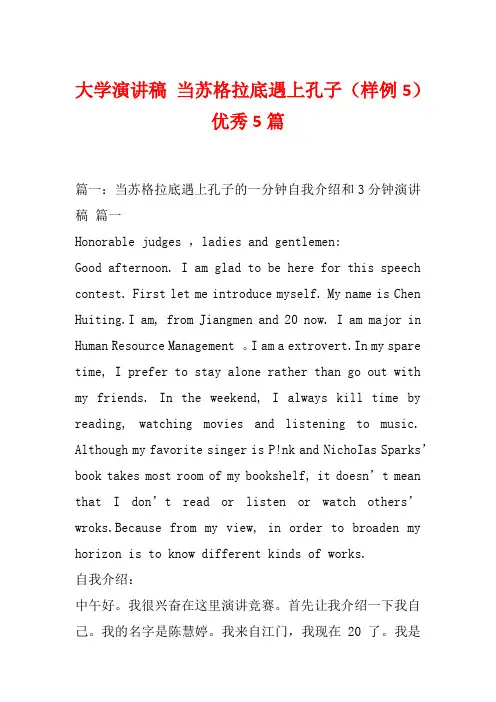
大学演讲稿当苏格拉底遇上孔子(样例5)优秀5篇篇一:当苏格拉底遇上孔子的一分钟自我介绍和3分钟演讲稿篇一Honorable judges ,ladies and gentlemen:Good afternoon. I am glad to be here for this speech contest. First let me introduce myself. My name is Chen Huiting.I am, from Jiangmen and 20 now. I am major in Human Resource Management 。
I am a extrovert.In my spare time, I prefer to stay alone rather than go out with my friends. In the weekend, I always kill time by reading, watching movies and listening to music. Although my favorite singer is P!nk and NichoIas Sparks’ book takes most room of my bookshelf, it doesn’t mean that I don’t read or listen or watch others’ wroks.Because from my view, in order to broaden my horizon is to know different kinds of works.自我介绍:中午好。
我很兴奋在这里演讲竞赛。
首先让我介绍一下我自己。
我的名字是陈慧婷。
我来自江门,我现在20了。
我是人力资源管理专业。
我是一特性特别向的人,但在我的业余时间,我喜爱一个人独处而不是和我的挚友出去。
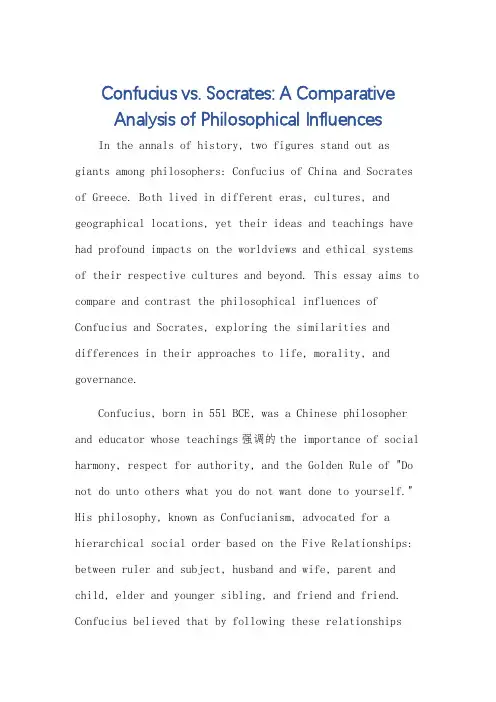
Confucius vs. Socrates: A ComparativeAnalysis of Philosophical InfluencesIn the annals of history, two figures stand out as giants among philosophers: Confucius of China and Socrates of Greece. Both lived in different eras, cultures, and geographical locations, yet their ideas and teachings have had profound impacts on the worldviews and ethical systems of their respective cultures and beyond. This essay aims to compare and contrast the philosophical influences of Confucius and Socrates, exploring the similarities and differences in their approaches to life, morality, and governance.Confucius, born in 551 BCE, was a Chinese philosopher and educator whose teachings强调的the importance of social harmony, respect for authority, and the Golden Rule of "Do not do unto others what you do not want done to yourself." His philosophy, known as Confucianism, advocated for a hierarchical social order based on the Five Relationships: between ruler and subject, husband and wife, parent and child, elder and younger sibling, and friend and friend. Confucius believed that by following these relationshipsand practicing virtues such as benevolence, righteousness, propriety, wisdom, and trustworthiness, individuals could achieve personal and societal harmony.In contrast, Socrates, who lived from 469 to 399 BCE, was a Greek philosopher known for his method of inquiry known as Socratic dialogue. Socrates emphasized the importance of self-examination and questioned conventional wisdom, often through rhetorical questions designed to expose the flaws in one's arguments. He believed that true wisdom came from knowing oneself and understanding the nature of reality, rather than from external authorities or traditions. Socrates's approach to morality was based on the concept of the unexamined life not worth living, emphasizing the importance of critical thinking and personal growth.Despite their differences, there are also significant similarities between Confucius and Socrates. Both philosophers were committed to seeking truth and wisdom, and both emphasized the importance of personal growth and moral character. Both Confucius and Socrates believed that a person's actions should be guided by principles of rightand wrong, rather than by selfish desires or external pressures. Furthermore, both philosophers recognized the importance of education in cultivating virtuous character and fostering societal harmony.In terms of governance, both Confucius and Socrates advocated for a form of government that was based on the principles of fairness and justice. Confucius believed that a ruler should govern with benevolence and righteousness, upholding the Five Relationships and promoting social harmony. Socrates, on the other hand, believed that the best form of government was one that fostered critical thinking and encouraged citizens to question and challenge authority. Both philosophers saw education as a crucialtool for fostering citizen engagement and promoting responsible governance.In conclusion, while Confucius and Socrates differed in their approaches to life, morality, and governance, they shared a common commitment to seeking truth, fostering personal growth, and promoting societal harmony. Both philosophers emphasized the importance of education and the role of the individual in creating a just and virtuoussociety. Their teachings have had profound impacts on their respective cultures and continue to influence theworldviews and ethical systems of people around the globe.**孔子与苏格拉底:哲学影响的比较分析**在历史的长河中,两位哲学家崭露头角,成为巨擘:中国的孔子和希腊的苏格拉底。
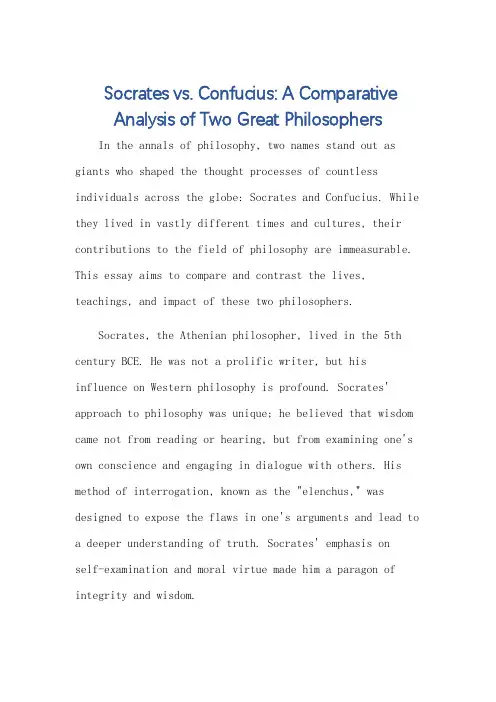
Socrates vs. Confucius: A ComparativeAnalysis of Two Great PhilosophersIn the annals of philosophy, two names stand out as giants who shaped the thought processes of countless individuals across the globe: Socrates and Confucius. While they lived in vastly different times and cultures, their contributions to the field of philosophy are immeasurable. This essay aims to compare and contrast the lives, teachings, and impact of these two philosophers.Socrates, the Athenian philosopher, lived in the 5th century BCE. He was not a prolific writer, but his influence on Western philosophy is profound. Socrates' approach to philosophy was unique; he believed that wisdom came not from reading or hearing, but from examining one's own conscience and engaging in dialogue with others. His method of interrogation, known as the "elenchus," was designed to expose the flaws in one's arguments and lead to a deeper understanding of truth. Socrates' emphasis onself-examination and moral virtue made him a paragon of integrity and wisdom.Confucius, on the other hand, was a Chinese philosopher who lived in the 8th century BCE. His teachings, known as Confucianism,强调仁爱、礼制和中庸之道,formed the moral and ethical foundation of Chinese society for centuries. Confucius believed that social harmony and order were essential for a well-functioning society. He advocated for the importance of education, stressing the need for individuals to cultivate their moral character through study and self-reflection. Confucius' influence extendedfar beyond China, with his teachings finding a place in the cultural and philosophical traditions of East Asia.Despite their different backgrounds and cultural contexts, Socrates and Confucius share some fundamental similarities in their approach to philosophy and morality. Both philosophers emphasized the importance of self-reflection and personal growth. They believed that true wisdom came from examining one's own conscience andstriving to improve oneself. Both also placed a strong emphasis on the role of morality in society, arguing that a well-ordered society depended on the moral character of its individuals.However, their differences are also noteworthy. Socrates' approach to philosophy was more focused on individual inquiry and critical thinking, while Confucius' teachings emphasized social harmony and the importance of following traditional values. Socrates' life ended tragically, as he was condemned to death for corrupting the youth of Athens, while Confucius enjoyed a more peaceful existence, teaching and influencing countless students during his lifetime.In conclusion, Socrates and Confucius are two of the most influential philosophers in history, each making indelible contributions to the field of philosophy and morality. While their approaches and emphases differ, their shared commitment to self-reflection and personal growth, as well as their understanding of the role of morality in society, makes them relevant and important figures in the history of philosophy. Both philosophers remind us of the importance of examining our own beliefs and actions, striving to improve ourselves, and seeking wisdom and understanding in order to create a more just and harmonious world.**苏格拉底与孔子:两位伟大哲学家的比较分析** 在哲学编年史中,有两个名字犹如巨人般屹立,他们塑造了全球无数人的思维过程:苏格拉底和孔子。
比较苏格拉底和孔子英语作文250词English: Both Socrates and Confucius were influential philosophers in their respective cultures, shaping the way people think about ethics, morality, and the meaning of life. Socrates, a Greek philosopher, is known for his Socratic method and his commitment to seeking truth and wisdom through questioning and dialogue. He believed that knowledge is the key to living a virtuous life and that understanding oneself is the path to true wisdom. On the other hand, Confucius, a Chinese philosopher, focused on the importance of social harmony, filial piety, and the cultivation of moral character. He emphasized the significance of ritual, tradition, and proper conduct in creating a stable and prosperous society. While both philosophers sought to guide people towards living a good life, their approaches differed in terms of their emphasis and methods. Socrates tended to focus on individual introspection and the pursuit of knowledge, while Confucius emphasized social and moral values within the context of the community. Despite their differences, both Socrates and Confucius have left a lasting impact on the world, with their teachings continuing to be studied and revered to this day.中文翻译: 苏格拉底和孔子都是各自文化中有影响力的哲学家,塑造了人们对伦理道德和生活意义的思考方式。
Confucius vs. Socrates: A ComparativeAnalysisTwo of the most influential thinkers in the history of philosophy, Confucius and Socrates, stand as beacons of wisdom across the ages. While their teachings originated in different cultures and eras, they share remarkable similarities in their approach to life, morality, and the quest for knowledge. This essay aims to delve into the parallels and divergences between the two philosophers, comparing their methods, principles, and impacts on society. Confucius, a Chinese philosopher of the 8th century BCE, advocated a philosophy centered on the concept of "ren" or benevolence. He emphasized the importance of social harmony and the role of individuals in maintaining it. Confucius's teachings were based on the belief that human beings are born with inherent moral qualities that need to be nurtured and developed through education and personal effort. He advocated a hierarchical social order in which each individual played their designated role, promotingstability and prosperity.In contrast, Socrates, a Greek philosopher of the 5th century BCE, focused on the examination of the individual conscience and the quest for truth through dialogue. He emphasized the importance of self-awareness and the needfor individuals to question their beliefs and assumptions. Socrates believed that wisdom and morality are inseparable, and he encouraged his followers to engage in critical thinking and self-reflection to arrive at a deeper understanding of the world and their place within it.Despite their different starting points, Confucius and Socrates converged on several key points. Both emphasized the importance of education as a tool for personal growth and social progress. Confucius believed that education should be accessible to all, regardless of their social status, while Socrates saw education as a lifelong process of self-discovery and refinement. Both philosophers also valued the power of dialogue and the importance oflistening to others' perspectives, viewing it as a crucial step towards understanding and wisdom.However, their approaches to knowledge and morality differed significantly. Confucius's morality was rooted intradition and social norms, emphasizing obedience and respect for authority. In contrast, Socrates questioned everything, including conventional wisdom and established authorities, in search of truth and wisdom. This approach often led him to conflict with the authorities of his time, resulting in his eventual trial and execution.The impacts of Confucius and Socrates on society have also been profound. Confucianism, the philosophy derived from Confucius's teachings, has had a significant influence on East Asian culture, particularly in China, Korea, and Japan. It has shaped social norms, political systems, and educational practices for centuries. On the other hand, Socrates's influence is felt primarily in Western philosophy and culture. His legacy lives on through the tradition of critical thinking, skepticism, and the search for truth and wisdom that has shaped much of Western intellectual history.In conclusion, while Confucius and Socrates differed in their approach to life, morality, and knowledge, they share a common commitment to personal growth, social harmony, and the pursuit of wisdom. Their teachings, although rooted indifferent cultures and eras, offer insights and guidancethat are relevant and valuable to individuals and societies across the globe. By comparing and contrasting their philosophies, we can gain a deeper understanding of the complexities and nuances of human thought and aspiration.**孔子与苏格拉底之比较分析**孔子和苏格拉底,这两位哲学史上最具影响力的思想家,跨越时空,成为智慧之光。
苏格拉底和孔夫子的相同和不同之处英语作文Socrates and Confucius were both great thinkers in the history of philosophy. They lived in different time periods and regions but shared some commonalities as well as differences in their teachings and philosophies.苏格拉底和孔子都是历史哲学上的伟大思想家。
他们生活在不同的时期和地区,但在他们的教导和哲学思想中都有一些共同点和差异。
One major similarity between Socrates and Confucius is their emphasis on the importance of self-cultivation and moral education. Both thinkers believed in the transformative power of education and the cultivation of virtue in shaping the character of individuals and creating a harmonious society.苏格拉底和孔子之间一个主要的共同点是他们对自我修养和道德教育的重视。
两位思想家都相信教育的转化力量,以及培养美德对于塑造个体品质和建立和谐社会的重要性。
Another similarity lies in their commitment to the pursuit of truth and wisdom. Socrates and Confucius both sought to uncover the nature of human existence and the principles that govern a just and righteous life. They encouraged critical thinking and self-examination as essential means to attain wisdom and enlightenment.另一个相似之处在于他们追求真理和智慧的承诺。
苏格拉底和孔子的生活异同点英语作文Socrates and Confucius: A Comparison of Their Lives。
Socrates and Confucius were two great philosophers who lived in different time periods and cultural contexts. Despite the differences, they shared some similarities in their lives. This article aims to explore the similarities and differences between Socrates and Confucius, focusing on their upbringing, teachings, and legacies.Firstly, let's examine their upbringing. Socrates was born in Athens, Greece, around 469 BC. He came from a modest background and his father was a sculptor. Socrates received a basic education in arithmetic, geometry, and music, which was typical for Athenian boys. On the other hand, Confucius was born in Lu, China, in 551 BC. He was born into a noble family and received a comprehensive education in various subjects, including music, history, and the arts. Both Socrates and Confucius valued education and believed in the power of knowledge.Moving on to their teachings, Socrates and Confucius had different approaches. Socrates was known for his Socratic method, a form of inquiry that aimed to stimulate critical thinking and self-reflection. He believed in questioning everything and challenging conventional wisdom. Confucius, on the other hand, focused on moral values and social harmony. He emphasized the importance of filial piety, respect for authority, and the cultivation of virtues. While Socrates sought to challenge and question, Confucius aimed to establish social order and moral righteousness.Despite their differences, Socrates and Confucius both had a profound impact on their respective societies. Socrates was a controversial figure in Athens and was eventually sentenced to death for his philosophical ideas. His legacy, however, lived on through his students, most notably Plato. Socrates' emphasis on critical thinking and self-examination laid the foundation for Western philosophy. Confucius, on the other hand, lived during a time of political turmoil in China. He dedicated his life to teaching and writing, and his teachings became the foundation of Confucianism, a philosophy thatshaped Chinese society for centuries. Confucius' emphasis on social harmony and moral values influenced not only China but also neighboring countries such as Japan and Korea.In conclusion, Socrates and Confucius were two influential philosophers who lived in different times and cultural contexts. Despite their differences in upbringing, teachings, and legacies, they both valued education and had a profound impact on their societies. Socrates' emphasis on critical thinking and self-reflection laid the foundation for Western philosophy, while Confucius' focus on moral values and social harmony shaped Chinese society for centuries. Both philosophers left a lasting legacy that continues to inspire and influence people to this day.。
孔子和苏格拉底的教育思想对比英语作文全文共3篇示例,供读者参考篇1Comparison of the Educational Thoughts of Confucius and SocratesEducation is a fundamental aspect of human development and has been a topic of great interest throughout history. Two of the most prominent figures in the realm of education are Confucius, a Chinese philosopher, and Socrates, a Greek philosopher. Despite living in different time periods and cultures, both Confucius and Socrates made significant contributions to the field of education through their unique perspectives and teachings. In this essay, we will compare and contrast the educational thoughts of Confucius and Socrates, exploring the similarities and differences in their ideas about the purpose and methods of education.Confucius, also known as Kong Zi, lived in China during the Spring and Autumn period. He believed that education was crucial for the moral and intellectual development of individuals, as well as for the betterment of society as a whole. Confuciusemphasized the importance of self-cultivation, moral integrity, and social harmony in education. He believed that education should focus on character development, virtue, and ethical behavior. Confucius advocated for a hierarchical system of education, where teachers were respected and revered, and students were expected to show filial piety and respect for their elders.Socrates, on the other hand, was a philosopher in ancient Greece who lived during the Classical period. He is often credited as the founder of Western philosophy and is famous for his method of questioning, known as the Socratic method. Socrates believed that education was a process of self-discovery and critical thinking. He encouraged his students to question everything, to think for themselves, and to seek knowledge through dialogue and inquiry. Socrates believed that true education should lead to self-awareness, intellectual growth, and the pursuit of truth.Despite their differences, Confucius and Socrates shared some common beliefs about education. Both philosophers believed in the importance of moral development andself-improvement. They both emphasized the role of the teacher in guiding and mentoring students on their educational journey.They also believed that education should be a lifelong pursuit, not just something that happens in school but a continuous process of learning and self-improvement.However, there were also significant differences in the educational thoughts of Confucius and Socrates. Confucius focused more on the importance of social roles and hierarchical relationships in education, while Socrates emphasized individual autonomy and critical thinking. Confucius believed in the importance of tradition and cultural values, while Socrates valued intellectual inquiry and the pursuit of truth above all else. Confucius viewed education as a means to maintain social order and harmony, while Socrates saw it as a way to challenge authority and question convention.In conclusion, the educational thoughts of Confucius and Socrates provide valuable insights into the nature and purpose of education. While they had different perspectives and approaches, both philosophers shared a common goal of promoting moral and intellectual development in individuals. Confucius's emphasis on tradition, virtue, and social harmony complemented Socrates's focus on critical thinking,self-discovery, and intellectual inquiry. By studying the ideas of Confucius and Socrates, we can gain a deeper understanding ofthe complexities of education and the diverse perspectives that have shaped this essential aspect of human society.篇2Comparison of Confucius and Socrates' Educational ThoughtsIntroductionEducation is an essential aspect of human development and civilization. Throughout history, numerous philosophers and scholars have contributed their thoughts on education. Among them, two prominent figures are Confucius from China and Socrates from ancient Greece. Both Confucius and Socrates proposed unique educational philosophies that have left a significant impact on their respective cultures. In this essay, we will compare and contrast the educational thoughts of Confucius and Socrates.Confucius' Educational ThoughtsConfucius, also known as Kong Zi, was a Chinese philosopher and educator who lived during the Spring and Autumn period. He emphasized the importance of education in cultivating moral character and achieving social harmony. Confucius believed that education should focus on moral cultivation, self-improvement,and filial piety. His educational thoughts can be summarized as follows:1. Self-cultivation: Confucius believed that education should begin with self-cultivation. He emphasized the importance of self-discipline, self-reflection, and self-improvement. Confucius taught that individuals should strive to become good persons by cultivating virtues such as filial piety, loyalty, righteousness, and propriety.2. Family ethics: Confucius stressed the significance of family ethics in education. He believed that filial piety, respect for elders, and harmonious family relationships were essential for building a strong society. Confucius viewed the family as the foundation of social order and morality.3. Social harmony: Confucius advocated for social harmony through education. He believed that education should promote social cohesion, harmony, and peace. Confucius emphasized the importance of moral education in creating a just and harmonious society.Socrates' Educational ThoughtsSocrates was a Greek philosopher and educator who lived during the Classical period. He is known for his method ofinquiry, the Socratic method, which involves asking questions to stimulate critical thinking and self-discovery. Socrates' educational thoughts can be summarized as follows:1. Dialogue and questioning: Socrates believed in the power of dialogue and questioning in education. He encouraged his students to engage in critical thinking, self-examination, and debate. Socrates believed that true knowledge could only be attained through questioning and self-discovery.2. Ethical inquiry: Socrates emphasized ethical inquiry and moral reflection in education. He believed that education should focus on cultivating virtues, such as wisdom, courage, temperance, and justice. Socrates taught that ethical inquiry was essential for personal growth and moral development.3. Self-knowledge: Socrates emphasized the importance of self-knowledge in education. He believed that individuals should strive to know themselves, understand their values, and lead a examined life. Socrates taught that self-knowledge was the key to personal fulfillment and happiness.Comparison and ContrastWhile Confucius and Socrates had different cultural backgrounds and lived in different historical contexts, theyshared some common principles in their educational thoughts. Both Confucius and Socrates believed in the importance of moral education, self-cultivation, and ethical inquiry. However, there were also significant differences between their educational philosophies.Confucius focused on the cultivation of moral character, family ethics, and social harmony in education, while Socrates emphasized dialogue, questioning, and self-knowledge. Confucius viewed education as a means to promote social cohesion and harmony, while Socrates saw education as a tool for personal growth and self-realization. Confucius emphasized the importance of tradition, hierarchy, and social order, while Socrates valued individual autonomy, critical thinking, and intellectual inquiry.In conclusion, the educational thoughts of Confucius and Socrates have made a lasting impact on human civilization. Both philosophers emphasized the importance of education in personal growth, moral development, and social harmony. While Confucius focused on moral cultivation and social ethics, Socrates emphasized dialogue, self-knowledge, and ethical inquiry. By studying and comparing the educational thoughts ofConfucius and Socrates, we can gain insights into the different perspectives on education and the human condition.篇3Comparison of Confucius and Socrates' Educational PhilosophiesEducation is a fundamental aspect of society that shapes the values, beliefs, and behaviors of individuals. Two prominent philosophers, Confucius in China and Socrates in ancient Greece, developed distinct educational philosophies that continue to influence educational practices today. This essay aims to compare the educational philosophies of Confucius and Socrates, highlighting their similarities and differences.Confucius, also known as Kongzi or Kong Fuzi, was a Chinese philosopher who lived during the Spring and Autumn Period of Chinese history. He emphasized the importance of education in cultivating moral character and social harmony. Confucius believed that education should focus on moral cultivation,self-improvement, and the pursuit of benevolence (ren). He emphasized the importance of rituals, etiquette, and filial piety in shaping individuals' moral character. Confucius' educationalphilosophy was based on the principles of lifelong learning, self-reflection, and ethical conduct.On the other hand, Socrates was an ancient Greek philosopher who lived during the Classical Period of Greek history. Socrates is known for his belief in the power of inquiry, critical thinking, and self-examination. He developed the Socratic Method, a dialectical approach to teaching that involves asking probing questions to stimulate critical thinking andself-awareness. Socrates believed that true knowledge comes from questioning assumptions, examining beliefs, and seeking the truth through rational inquiry. He emphasized the importance of intellectual humility, open-mindedness, and intellectual curiosity in the pursuit of knowledge.Despite their cultural and historical differences, Confucius and Socrates shared some common educational beliefs and values. Both philosophers believed in the transformative power of education in shaping individuals' characters, values, and behaviors. They both emphasized the importance ofself-cultivation, moral integrity, and social responsibility. Confucius and Socrates both promoted the idea that education should empower individuals to become virtuous and wise citizens who contribute positively to society.However, Confucius and Socrates also had different educational approaches and methods. Confucius emphasized the importance of tradition, rituals, and social norms in shaping individuals' moral character. He believed that education should focus on instilling moral virtues, ethical values, and social harmony through rituals, etiquette, and filial piety. Confucius' educational philosophy was based on the principles of harmony, hierarchy, and filial piety.Socrates, on the other hand, questioned traditional beliefs, challenged societal norms, and encouraged individuals to think critically and independently. He believed that education should stimulate intellectual curiosity, encourage self-examination, and promote rational inquiry. Socrates' educational philosophy was based on the principles of inquiry, debate, and self-reflection.In conclusion, the educational philosophies of Confucius and Socrates highlight the importance of moral cultivation, critical thinking, and self-awareness in education. While Confucius emphasized the importance of tradition, rituals, and social harmony in shaping individuals' moral character, Socrates advocated for questioning assumptions, challenging beliefs, and seeking the truth through rational inquiry. Despite their differences, both philosophers believed in the transformativepower of education in empowering individuals to become virtuous, wise, and responsible citizens. Their educational philosophies continue to inspire educators and shape educational practices around the world.。
孔子和苏格拉底的不同英语作文Confucius and Socrates: A Comparative Reflection on Two Philosophical GiantsThe intellectual legacies of Confucius and Socrates, though originating from vastly different cultural contexts, have both profoundly influenced the development of philosophical thought and ethical behavior. Confucius, a Chinese philosopher born in 551 BCE, and Socrates, aclassical Greek philosopher born in 470 BCE, shared a common goal of promoting moral virtues and social harmony throughtheir teachings. However, their approaches to achieving these ends were distinct, reflecting the unique characteristics of their respective societies.Confucius emphasized the importance of social harmony and the individual's role within the family and state. His philosophy, known as Confucianism, centers around the concept of "Ren" (仁), which can be translated as humaneness or benevolence. Confucius believed that through the cultivationof virtue, particularly through the practice of "Li" (礼), or ritual propriety, individuals could achieve a state of moral excellence. He advocated for a hierarchical social structure where each person knew their place and fulfilled their role with integrity and respect for others. This system was designed to maintain order and stability within the community.On the other hand, Socrates focused on the individual'squest for knowledge and self-improvement. His method of inquiry, known as the Socratic method, involved asking probing questions to stimulate critical thinking and to expose the contradictions in one's beliefs. Socrates believed that the unexamined life was not worth living, and he sought to encourage his fellow citizens to question their assumptions and to strive for wisdom. Unlike Confucius, Socrates did not establish a structured system of thought but rather left a legacy of philosophical dialogue and thepursuit of truth.The differences in their teachings can be attributed to the societal needs and values of their times. Confucius lived during a period of social upheaval in China, where he saw the need for a moral framework to guide people and restore social order. His teachings provided a blueprint for a well-ordered society based on respect for authority and adherence to traditional values.Socrates, in contrast, lived in a democratic Athens where the exchange of ideas was valued. He was more concerned with the individual's moral development through self-examination and the application of reason. His approach was more confrontational, challenging the status quo and the complacency of his contemporaries.Despite their differences, both philosophers recognized the importance of moral character and the role of educationin shaping individuals. They both believed in the transformative power of knowledge and the pursuit of virtue as a means to improve society. Their teachings continue toinspire and guide ethical and philosophical discourse to this day, demonstrating the timeless relevance of their insights into human nature and the good life.In conclusion, Confucius and Socrates, though separated by geography and history, both made indelible contributions to the ethical and philosophical landscape of human thought. Confucius with his focus on social harmony and ritual propriety, and Socrates with his emphasis on individual self-examination and the love of wisdom, offer complementary perspectives on the path to a virtuous and meaningful life. Their teachings remind us that while the specifics of our moral and intellectual pursuits may vary, the quest for a better society and a more enlightened self is a universal endeavor.。